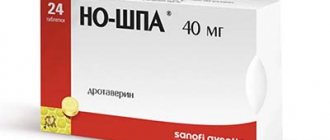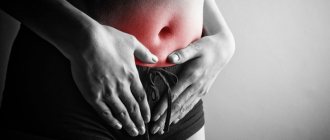Features of female nausea
Menstruation is a physiological process that signifies a woman’s readiness to conceive and means that fertilization has not occurred.
A regular menstrual cycle is a sign of reproductive health. The body is naturally prepared for it, which means it can endure it like any other period of life. PMS is the result of the modern rhythm, increased stress on the female body and excessive psycho-emotional stress. This phenomenon is outside the norm. Within its limits there should be no PMS, painful periods and other disorders during menstruation.
Taking into account all the features of women's life, gynecologists consider PMS as a variant of the norm. Psychologists call the syndrome a psychosomatic phenomenon associated with the suspiciousness of girls. However, 60% of women know firsthand what PMS is. Typical manifestations of premenstrual syndrome:
- headache;
- mood swings;
- pulling sensations in the lower abdomen;
- discomfort in the buttocks and lower back.
Nausea is not on the list. This symptom significantly disrupts the woman’s well-being and is considered a sign of some kind of disorder in her body.
Nausea before, during or immediately after menstruation is considered a manifestation of “severe” PMS. Women whose syndrome occurs with a significant deterioration in well-being are forced to mitigate the symptoms with medications or spend an unpleasant period in bed.
How to behave correctly during menstruation
To prevent a woman’s well-being from deteriorating, during menstruation it is prohibited:
- Lift heavy objects and subject the body to severe physical stress.
- It is better to refuse to visit the sauna, steam room or steam room.
- You should not drink alcohol. If you have your period and the nausea does not stop, this may be a sign of pregnancy or illness. Therefore, alcohol can only worsen a woman’s condition.
- You need to eat a balanced diet, including more fresh vegetables and fruits.
Nausea, dizziness, and headaches that occur during menstruation are not considered a sign of a woman’s normal condition. Therefore, it is necessary to seek help from a specialist and not self-medicate.
If you feel sick before your period
The first signs of PMS can appear 7-10 days before the start of menstruation. During this period, hormonal fluctuations occur (changes in progesterone levels), to which the female body reacts with nausea and abdominal discomfort. Women experience weakness, suffer from digestive disorders, and increased gas formation in the intestines. In the later stages of PMS, headaches and irritability occur. As the level of progesterone in the blood decreases, emotional lability develops: the woman becomes too sensitive and even tearful. All manifestations of the syndrome completely disappear with the onset of menstruation or immediately after their end.
A woman may feel sick during PMS due to increased physical activity, stressful situations, eating disorders, following strict diets, and overwork. This is how the body reacts to fluctuations in hormone levels and increased blood supply to the uterus.
How to deal with the symptom
To eliminate nausea caused by PMS, you need to be attentive to your health before the syndrome manifests itself. On the eve of menstruation, a woman should remain calm, avoid stress and urgent work tasks. It is possible to ease the functioning of the gastrointestinal tract during a hormonal storm with a balanced diet and moderate physical activity. Dynamic sports exercises accompanied by loud music, cycling, and swimming in the pool will help you get distracted.
For complicated PMS, accompanied by extensive skin rashes, severe nausea, and migraines, it makes sense to visit a gynecologist. The doctor will figure out why the symptom occurred and select medications that can mitigate the impact of hormonal changes. Homeopathic or herbal remedies are often prescribed (Mastodinon, Cyclodinone, Dismenorm). In case of pronounced PMS, it is appropriate to prescribe hormonal contraceptives. The product will maintain estrogen levels for a month, which will relieve the woman from the manifestations of the syndrome.
Feeling of nausea during menstruation
Menstrual bleeding may be heavy. Women with gynecological inflammations and abnormalities in the structure of the reproductive system are prone to such problems. Bleeding is accompanied by increased production of prostaglandins, which provoke intense pain. Due to pain and bleeding, a woman may experience weakness, nausea and apathy. Vomiting often occurs during menstruation. In such cases, they speak of severe algodismenorrhea.
It can be provoked by excessive physical activity, heavy lifting, regular lack of sleep and chronic fatigue. Sometimes algodismenorrhea appears already from the first menstruation.
How to deal with the symptom
According to gynecologists, such reactions are unnatural for the female body and indicate deviations from the physiological norm. During a gynecological examination of women with the described signs, inflammation in the uterus and appendages and endometriosis are detected. Excessive bleeding can be caused by polyps and neoplasms in the uterine cavity.
After treatment of the main problem, algodismenorrhea recedes. To relieve inflammation, antibiotics and NSAIDs are prescribed, and tumors are removed using minimally invasive interventions. The intensity of bleeding is reduced by tincture of water pepper, the drugs Tranexam and Hemotran. To speed up recovery, the doctor will prescribe drugs that stabilize the cycle. It is possible to use phytotherapeutic agents (Normotsikl) and homeopathy (Remens).
Physical activity during menstruation
If you experience nausea during menstruation, then physical exercise before it begins is strongly recommended by experts.
A close connection has been noticed, which is manifested by the production of endorphins during sports and the mental state of a woman. Physical activity can reduce the appearance of pain during menstruation.
A light warm-up accompanied by pleasant music and a walk in the fresh air can effectively reduce swelling and mood swings.
Nausea after menstruation
After menstruation, all unpleasant signs of PMS disappear. Nausea after menstruation is a rare occurrence. It may indicate hormonal imbalances and increased physical activity of a woman during menstrual periods. Active sports activities increase the pressure of the uterus on the nerve trunks of the spinal cord. If a girl suffers from heavy bleeding, nausea and dizziness may be manifestations of anemia. In this case, the body suffers from a lack of oxygen, and nausea acts as a signal from the corresponding center in the brain.
How to deal with the symptom
Normalizing your daily routine, proper rest and nutrition will help eliminate negative symptoms. It would be useful to consult a gynecologist. The doctor will prescribe medications that can prevent heavy blood loss and nausea during the next menstruation. If anemia is confirmed by laboratory tests, the woman will need to take iron supplements and multivitamin complexes.
Diet during menstruation
If nausea occurs during menstruation, then a balanced diet will help to effectively reduce these symptoms. A woman should eat foods that contain healthy, slowly digestible carbohydrates. These include:
- bread, cereals, pasta;
- fruits vegetables;
- low-calorie dairy products;
- nuts.
From a woman’s menu, especially before menstruation, it is necessary to exclude:
- fatty, spicy, smoked;
- alcohol, coffee;
- sweets, sugar.
It is necessary to eat food in fractions. To avoid swelling, you should reduce your salt intake.
Are you sure it's because of your period?
The regular occurrence of nausea due to PMS or menstruation really requires consultation with a gynecologist. However, the symptom can signal problems in other organs and systems. The association with menstruation may simply be a coincidence. Nausea can be a sign of:
- chronic intoxication - for example, when working in hazardous conditions or while taking medications;
- acute intoxication – food and toxic poisoning;
- diseases of the gastrointestinal tract - gastritis, pancreatitis, diseases of the intestines, liver, gall bladder;
- psychoneurotic disorders - excessive exposure to stress, neurological diseases;
- infectious diseases - infection with rotavirus, hepatitis viruses;
- disorders of blood sugar levels - the manifestation of diabetes mellitus is often accompanied by a feeling of nausea;
- circulatory disorders - vascular spasms, their obstruction.
Due to the natural decrease in immunity and increased sensitivity of the body under the influence of hormones, these disorders can manifest themselves for the first time during menstruation. If nausea appears during PMS for the first time, there is reason to think and take a closer look at the condition. Other disorders differ from PMS by additional symptoms:
- weakness, drowsiness, severe dizziness;
- diarrhea or constipation;
- heartburn, bloating, feeling of heaviness in the stomach;
- vomit;
- tremor of the limbs, tendency to migraines, pain in various parts of the body;
- bad breath, increased diuresis;
- pain in the neck, back of the head.
If nausea is a sign of other abnormalities in the functioning of the body, it will manifest itself during menstruation, after it, and even in the middle of the cycle. When a symptom first appears, you should wait. An occasional feeling of nausea without other symptoms may go away on its own. Severe, round-the-clock nausea ending in vomiting requires consulting a doctor. There is no point in waiting for your period to end. Delay may cause complications.
We do not rule out pregnancy
If a woman of childbearing age has had at least one sexual intercourse during the cycle, pregnancy cannot be ruled out. Contraception is not taken into account, since even the most reliable methods cannot guarantee 100% protection.
The development of pregnancy is a highly individual process. Some women experience changes immediately after conception, while others live in the dark until their waist size increases. Therefore, menstruation does not guarantee the absence of pregnancy. But you should pay attention to sudden nausea before, during, or immediately after menstruation. It may be the first symptom of pregnancy. Conception should be suspected if:
- Vomits for the first time during menstruation;
- the nature of menstrual flow has changed;
- sensations during menstruation have changed;
- nausea occurred in the morning;
- the sensations disappeared as suddenly as they had appeared.
If nausea occurs in any of the above situations, it is better to purchase a pregnancy test. The simplest strips are not worth buying, as they show reliable results only after a delay. It is better to choose a more sensitive test.
Test strips with a sensitivity of 10 mmol/l are considered highly accurate (this is indicated on the packaging). They are able to display pregnancy a week after conception, before the delay.
Nausea is an unnatural symptom of PMS or menstruation. The symptom requires increased attention, as it can indicate serious disorders in the body. Sudden nausea is a signal that a woman needs to take care, as life is being born in her womb.
What to pay attention to
To help yourself in time, you need to pay special attention to the body’s behavior during menstruation. If nausea occurs for the first time, and no pathologies have been previously diagnosed, the condition may indicate the onset of a disease. A woman should be alert to the following symptoms:
- Discharge with a putrid or sour odor, frequent urge to go to the toilet, painful urination, itching of the external genitalia. These signs indicate an infection. If brown daub is present, you should be wary.
- Long, increasing pain in the lower abdomen and heavy menstruation. If you have to change your sanitary pad every 3 hours, you may be bleeding. Significant blood loss is accompanied by dizziness and nausea.
- Fever, increased body temperature, chills, and increased sweating indicate the onset of an inflammatory process.
- Secretion with dark seals or black discharge indicates infectious inflammation. In this case, the woman needs to have a smear test to avoid complications.
If such symptoms are detected, you should urgently see a gynecologist. Any disease can be cured if it is diagnosed in time and the necessary measures are taken.










